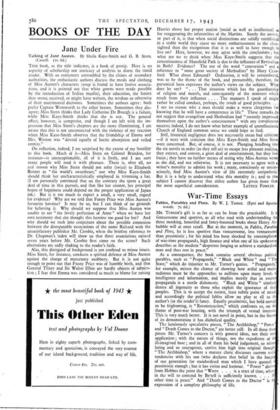BOOKS OF THE DAY
Jane Under Fire
THIS book, as the title indicates, is a book of gossip. Here is no .asperity of scholarship nor intricacy of analysis to alarm the timid reader. With an enjoyment untroubled by the claims of secondary authorities, the enthusiastic authors discuss the meals and clothing of Miss Austen's characters (soup is found to have festive associa- tions, and it is pointed out that white gowns were made possible by the introduction of Indian muslin), their education, the letters they wrote, received, or might have written, the wisdom or otherwise of their matrimonial decisions. Sometimes the authors agree: both prefer Captain Wentworth to the other heroes. Sometimes they dis- agree; Miss Stern thinks that Lady Catherine De Bourgh is a failure, while Miss Kaye-Smith thinks that she is not. The general effect, however, is composite, and though I am left with the im- pression that Miss Stern's chapters are the more illuminating, I am aware that this is not unconnected with the violence of my reaction when Miss Kaye-Smith observes that the friendship of Emma and Mrs. Weston was "devoid equally of hectic absorption and veiled enmity."
On reflection, indeed, I am surprised by the extent of my hostility to this book. Much of it—Miss Stern on Colonel Brandon, for instance—is unexceptionable, all of it is lively, and I am sure many people will read it with pleasure. There is, after -all, no real reason why Miss Stern should not refer (twice) to Elizabeth Bennet as "the world's sweetheart," nor why Miss Kaye-Smith should think her uncharacteristically employed in trimming a hat. (I am personally convinced that on the contrary she spent a great deal of time in this pursuit, and that like her creator, her principal hopes of happiness could depend on the proper application of Japan ink.) But is it too much to expect a small, a very small, regard for evidence? Why are we told that Fanny Price was Miss Austen's favourite heroine? It may be so, but I can think of no grounds for believing it. Why should we suppose that Miss Austen was unable to see "the lovely perfection of Anne" when we have her own testimony that she thought this heroine too good for her? And why should we rush into conjecture about the possible connexion between the disreputable associations of the name Richard with the unsatisfactory publisher Mr. Crosbie, when the briefest reference to Dr. Chapman's index will show us that these associations existed seven years before Mr. Crosbic first came on the scene? Such aberrations are sadly shaking to the reader's faith.
Alas, this disregard of background is not confined to minor issues. Miss Stern, for instance, conducts a spirited defence of Miss Austen against the charge of mercenary snobbery. But it is not quite enough to point out that Fanny Price was of humble birth, and that General Tilney and Sir Walter Elliot are hardly objects of admira- tion; I fear that Emma was considered as much to blame for raising Harriet above her proper station (social as well as intellectual) as for exaggerating the inferiorities of the Martins. Surely the answer, or part of it, is that when social distinctions are solidly established in a stable world they cause no more embarrassment to the clear- sighted than the recognition that it is as well to have enough to live on? Here, however, we may agree with the conclusions ; but what are we to think when Miss Kaye-Smith suggests that the censoriousness of Mansfield Park is due to the influence of Revivalism in Bath? Evidence? The use of the word " conversion " and a reference to "some great society of Methodists" by Mary Craw- ford. What about Edmund? Ordination, it will be remembered, was to be the theme of the book, and presumably, therefore, the parsonical hero expresses the author's views on the subject. What does he say? " . That situation which has the guardianship of religion and morals, and consequently of the manners which result from their influence . . . . The manners I speak of might rather be called conduct, perhaps, the result of good principles. ... I see no reason why a man should make a worse clergyman for knowing that he will have a competence in life." These remarks do not suggest that evangelism and Methodism had "recently impressed themselves upon the author's consciousness" with any conspicuous success; indeed, I do not know what better example of unenthusiastic Church of England common sense we could hope to find.
Still, historical negligence does not necessarily mean bad criticism —if it were with criticism that Miss Kaye-Smith and Miss Stem were concerned. But, of course, it is not. Plunging headlong inn the six novels in order (as they tell us) to escape less pleasant realities, they extract, and convey, a great deal of entertainment, but they lose focus ; they have no further means of seeing why Miss Austen wrote as she did, and not otherwise. It is not necessary to agree with writer's morality to admire his work ; many, consciously or uncon- sciously, find Miss Austen's view of life extremely antipathetic. But it is a help to understand what this morality is ; and to this subject I cannot discover that either author has given .more than


























 Previous page
Previous page